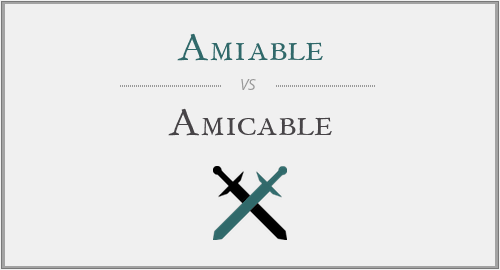There exists words in English language that appear to be closely related to each other hence people believe that their meanings if not exactly the same, are very much similar to each other. That is most often not the case, and it turns out that these words are being used in the wrong sense. People often use amiable and amicable interchangeably which causes a lot of confusion for the listeners and readers. In this article, we will throw light on the origin, meaning and examples of both the words so you never have any doubts about what means what.
Origin:
Amiable originated from late Middle English (originally in the senses ‘kind’, and ‘lovely, lovable’): via Old French from late Latin amicabilis ‘amicable’. The current sense, influenced by modern French aimable ‘trying to please’, dates from the mid 18th century. Amicable also originated from late Middle English (in the sense ‘pleasant, benign’, applied to things): from late Latin amicabilis, from Latin amicus ‘friend’
Amiable as adjective:
Amiable is used as an adjective in English language where it means having or displaying a friendly and pleasant manner.
The amiable young man greeted me enthusiastically.
Amicable as adjective:
Amicable is also used as an adjective in English language, and thus the confusion increases. It means something that is characterized by friendliness and absence of discord.
An amicable settlement of the dispute.
Examples:

An amiable fellow, Wally committed this historic act on April 14, 2003 quite by accident. [American Spectator]
No one wants to see this fun end, which is why the current labor negotiations are more amicable than they’ve been in the past. [Boston Globe]
He’s amiable in a familiar Midwestern way, his disposition varies between cheerfully earnest and wry, and he uses words like “gosh.” [Wall Street Journal]
Despite the earnest desire of many of the delegates to find an amicable solution to the growing crisis, the stated mission of the conference was doomed from the start. [Washington Post]
The amiable, shambling bears are also diplomats. [Los Angles Times]
But it would appear hopes for an amicable divorce were misguided, as Reid has apparently demanded £6million in their divorce settlement, while Price had planned to give him £700,000. [Metro]
Amiable or amicable:
Amiable means good-natured and likable. It describes people. Amicable means characterized by goodwill. It describes relationships or interactions between people. So, for instance, two amiable people might share an amicable friendship, or two amiable people might end their relationship amicably. Both amiable and amicable derive ultimately from the Latin amicabilis, meaning friendly. Amiable came to English from French in the 14th century and originally bore the sense now associated with amicable. It developed its modern sense shortly thereafter. Amicable entered English in the 16th century, already bearing its modern sense.




Have a discussion about this article with the community:
Report Comment
We're doing our best to make sure our content is useful, accurate and safe.
If by any chance you spot an inappropriate comment while navigating through our website please use this form to let us know, and we'll take care of it shortly.
Attachment
You need to be logged in to favorite.
Log In